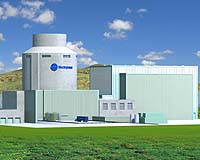 |
Amman (AFP) June 28, 2010 Energy-poor Jordan, which is in talks with the United States to sign a nuclear cooperation deal, said Monday it does not want to give up its right to peaceful atomic power under international treaties. "We are now in continuous negotiations with the United States, and the latest round was in Washington last week," Khaled Tukan, head of Jordan's Atomic Energy Commission, told AFP. "But I think we still don't have common ground. They started to understand our viewpoint, but still (there is) no common ground." Tukan said the Americans want their ally Jordan to sign a nuclear agreement similar to a deal they reached with the United Arab Emirates, which "has relinquished its rights under the nuclear Non-Proliferation Treaty (NPT)." "The United Arab Emirates has relinquished all its NPT rights to sensitive nuclear technology indefinitely," he said, adding: "Why should we give up our rights?" Tukan said Article Four of the NPT stipulates that "all countries have the right to full utilisation of peaceful nuclear energy, research and development." "We are sticking and adhering to the NPT, and (we want) full rights and privileges under the NPT," he said. Jordan, which imports about 95 percent of its energy needs, has signed nuclear cooperation agreements with several countries in a bid to produce atomic energy for power generation and water desalination. The country's 1.2 billion tonnes of phosphate reserves are estimated to contain 130,000 tonnes of uranium and the government wants the first nuclear plant to be ready by 2015. The kingdom is the latest Sunni Arab country, including Egypt and pro-Western Gulf Arab states, to announce plans for nuclear power programmes in the face of Shiite Iran's controversial atomic drive. On Monday, Israel's former justice minister Yossi Beilin slammed his country for trying to block Jordan from enriching its large reserves of uranium in its bid to become self-sufficient in electricity. "There is a certain risk in allowing Jordan to enrich uranium so close to Israel's border, but the risk in denying the king's request is far greater," he wrote in the International Herald Tribune. Beilin was referring to King Abdullah II, who in an interview with the Wall Street Journal on June 12, accused Israel of making "underhand" efforts to prevent his country from developing a peaceful nuclear energy programme.
Share This Article With Planet Earth
Related Links Nuclear Power News - Nuclear Science, Nuclear Technology Powering The World in the 21st Century at Energy-Daily.com
 Nucrane Manufacturing Now Fabricating Cranes For Nuclear Plants
Nucrane Manufacturing Now Fabricating Cranes For Nuclear PlantsPittsburgh PA (SPX) Jun 28, 2010 NuCrane Manufacturing (NuCrane) has begun fabricating, assembling and testing specialty cranes for nuclear power plants, including the Westinghouse-designed AP1000 plants under construction in China and those planned for future construction in the U.S. NuCrane - a joint venture between Westinghouse Electric Company subsidiary PaR Nuclear, Inc. of Shoreview, Minn., and Hutchinson Manufactur ... read more |
|
| The content herein, unless otherwise known to be public domain, are Copyright 1995-2010 - SpaceDaily. AFP and UPI Wire Stories are copyright Agence France-Presse and United Press International. ESA Portal Reports are copyright European Space Agency. All NASA sourced material is public domain. Additional copyrights may apply in whole or part to other bona fide parties. Advertising does not imply endorsement,agreement or approval of any opinions, statements or information provided by SpaceDaily on any Web page published or hosted by SpaceDaily. Privacy Statement |